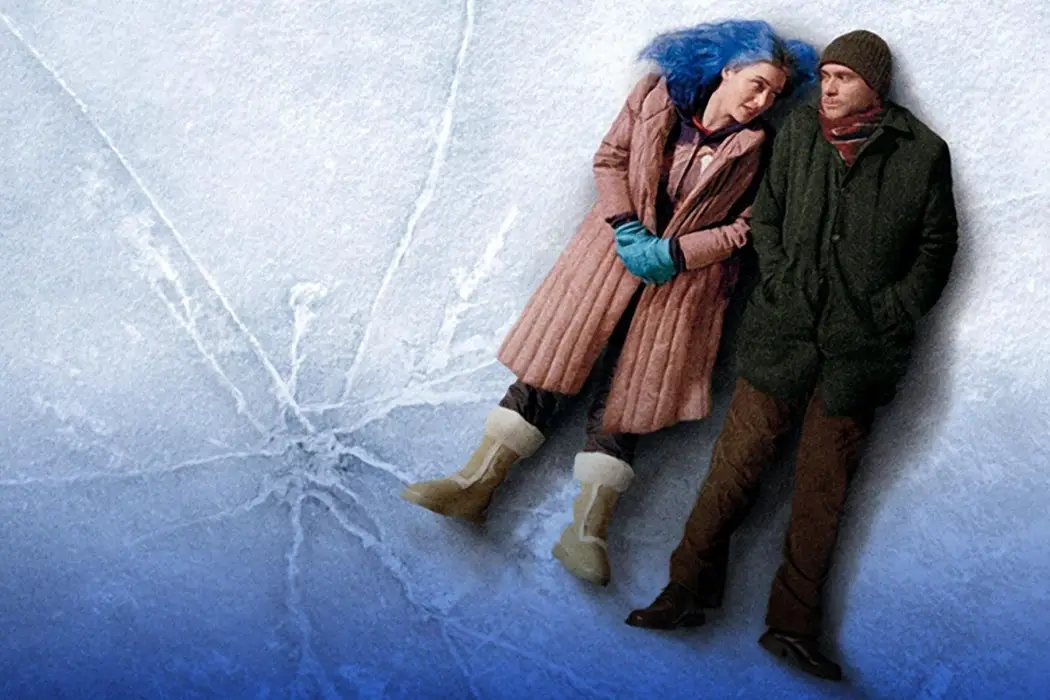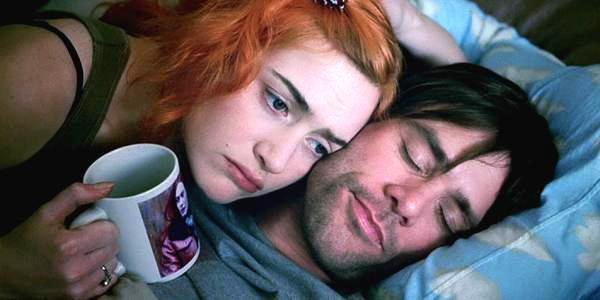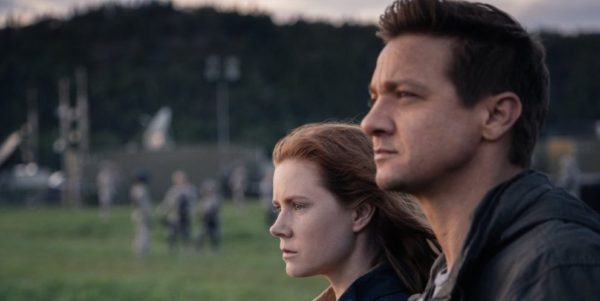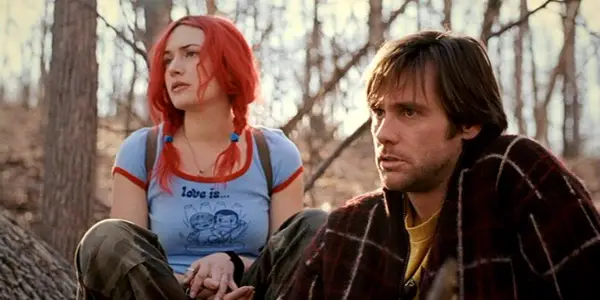ETERNAL SUNSHINE OF THE SPOTLESS MIND & Choosing Your Own Ending

Jack is a recent MA Graduate from the film department…
This article contains spoilers for Michel Gondry’s Eternal Sunshine of the Spotless Mind and Denis Villeneuve’s Arrival.
Connecting Regardless of Understanding
Nothing freaks me out quite like the idea that ultimately, things are just ‘meant to be’. Fate is a subject tackled repeatedly through storytelling, whether that be a mythical prophecy or two lovers destined to be together, but when applied to more realistic, grounded fiction, the idea that the central protagonists have no control over their own destiny makes me uneasy, perhaps due to the implication that, subsequently, I have no control over my own. When I first watched Michel Gondry’s startling Eternal Sunshine of the Spotless Mind, I was not in a position to understand it – I raved about the central performances, particularly that of Jim Carrey, and my eyes widened at the inventiveness of the storytelling, how the inside of a mind was told through such interesting visual means. Yet, crucially, I did not have a hope of grasping the idea that lay at its heart.
At the end of the film the central characters, Joel (Jim Carrey) and Clementine (Kate Winslet), have discovered that they were previously in a failed relationship, and that both of their memories have been erased through a medical procedure. Yet, in a small gloomy hallway in an apartment complex, Joel and Clementine find themselves in the first and most exciting beginning of a new relationship, where they can’t see a single thing to dislike about each other. So, even though they verbally acknowledge, face to face, that they will inevitably go down the same road as before, a road that ends with resentment, rejection and, yes, that medical amnesic procedure all over again, they decide to be together anyway. This contract, this acceptance of prioritising the journey above the ending, is sealed with a simple “okay”.
When I first watched the film, I didn’t realise what a revolutionary “okay” this would prove to be. Originally, I found the ending to be joyous: I saw the love that the two of them had for each other and almost dusted my hands of the bitterness that lay beneath the happiness, forgot about the final images of them repeating a snowball fight on a lonely beach, trapped to repeat the same mistakes over and over again.

This is exactly how I saw the film later in life – a mistake of a relationship doomed to repeat itself. For me, the ending twisted into a vaguely sinister tale of repeated mistakes and misplaced love; after all, Joel bitterly refers to Clementine at one point in the film as “a stranger” that he has spent too much time with, and his words, playing on a tape in his apartment, hang over the couple even as they profess a willingness to do it all over again.
Yes, the film suggests at the end that Joel and Clementine choose to relive and recreate all of their happy memories over and over again but at this point I simply could not get the anger and the hurt of their own personal ending out of my mind, the bitterness that drove each other to purposefully get their memories erased. Both characters were right that love is real and powerful and special, but perhaps they were wrong that that love should be found in the company of the other – a mistake that I could see repeating and repeating ad infinitum.
I no longer hold either of these interpretations of the ending, but I confess that, however much I admire and quite adore the ideas that the ending possesses, it still has a talent to freak me out, to make me uneasy. What makes me uneasy about Eternal Sunshine of the Spotless Mind now, as opposed to what worried me about it before, is that it possesses a bravery that I am unsure that I personally possess – it suggests that I’m wrong about fate.
Accepting the Pain of the Inevitable Ending
Herein lies the power of the film, a power that I know as a certainty has grabbed hold of many a viewer, and I think that power is borne in the bravery of the central characters in these final moments. At the end of many a relationship, comfort is delivered through stereotypes such as “don’t cry because its over, smile because it happened”, or vague ideas about the journey being more important than the destination. Eternal Sunshine of the Spotless Mind takes this idea and asks its characters whether they are content to be happy for the journey knowing, totally and unequivocally, that there will be tears and rage at the end.
Joel and Clementine know the ending of their story, mistakes and sadness aplenty, and accept it. The shock that this ending gives me, every time that I watch it, originates in its simplicity, that simple “ok”. That is an acceptance of relationships ending bitterly, it is a bare acceptance of the fact that neither of them are particularly suited for a relationship (nor, perhaps, compatible with each other) but most importantly, it is an acceptance that they value the trip down the tunnel more than they fear the darkness at the end of it.
Amazingly, it was only thanks to another film that I began to realise what an extraordinary ending this truly is.
The Beauty of Making a Choice in Arrival
“Despite knowing the journey, and where it leads, I embrace it, and welcome every moment of it”.
Denis Villeneuve’s 2016 science-fiction film Arrival managed to once again capture that shock, the same shock that Eternal Sunshine gave me, once I finally watched it in 2018. Crucially, I believe that this time I was ready for a film of such grand and often troubling ideas, ready for when the ending rose me up and then knocked me down. Arrival is well-known as a film about extra-terrestrial visitors who are as strange and as unknowable, and as passive as any real aliens may well be. The woman who is given the daunting task of communicating and deciphering the language of these visitors is Louise Banks, played by Amy Adams, who the audience have visually seen mourning the death of her young daughter, before the aliens have arrived.
The ending of Arrival is surgically and desperately attached to the beginning – they share the same music, some of the same shots and, most importantly, are focused around Hannah, Louise’s young daughter. The difference that resides in the two scenes is the same change of context that both Louise and the audience have now come to realise; that these memories are not of things that have already happened, but the choices that are to come soon in her life. In studying the aliens’ language, which rejects linear structure and is instead circular and constantly happening, Louise begins to see life as the aliens do, as their language is written, a simultaneous experience.
What now remains is the extraordinary and heartbreaking decision that circles around the final sequences of the film, as we see present, future and everything in-between collide – Louise can have a daughter with the man she will love, but she knows that if she does, her daughter will die and that man will leave her.

Story of Your Life, the novella by Ted Chiang on which Arrival is based, had a different premonition for Louise to follow. In the book, Hannah lives instead to be twenty-five, where she dies in a rock-climbing accident, whereas in the film, Hannah is a young teen who dies of an incurable disease. The book’s characterisation of Louise is partly designed for her to realise, and accept, that the universe is deterministic, and that even though she knows the future, she cannot stand in its way. The screenwriter for Arrival, Eric Haisserer, said in an interview that he didn’t like this ending and decided to change it because “I think it’s more profound for me if she has a choice…if she can change her future, and yet she chooses to have Hannah”.
The gift that the aliens give the world in Arrival, the ‘tool’ that they consistently refer to through communication, is their language. The gift to Louise in particular is not necessarily the knowledge of her daughter’s death, with the heartache and loss and grief that is tightly attached to it, but is instead the knowledge of the love and happiness that existed through Hannah’s short life. When her lover, Ian Donnelly (Jeremy Renner) asks Louise if she wants to have a baby together, Villeneuve does not cut away to images of Hannah dying in a hospital bed, or Louise crying by her bedside; he cuts to images of Hannah playing in the garden, of Ian cradling a young Hannah with love, of sunshine gleaming behind the curious face of Louise’s young daughter. The gift that the aliens give Louise is not the sense that fate has her trapped to one particular path of death and loss – what she gains instead is not only the ability to see which paths are open before her, but also the bravery to choose the one which ends in devastation.
The Bravery to Believe We Make Our Own Choices
Joel and Clementine are blessed with this knowledge as well. They are given the gift of the various tapes that reveal their past life with each other, a life that turned sour and resentful and that brought them both to the desperate avenue of a heartbreaking medical procedure. They are given intrinsic evidence of their bitter past and choose to do it all over again, knowing that although the ending may play itself over and over again, sad and broken, the journey will forever be full of little moments that made the decision worth it a thousand times over.
What inevitably draws me to both of these films is their negotiations of and perhaps also rejections of ideas that fate raises. We can see in Arrival that, inevitably, nothing changes in Louise’s future; at the beginning of the film, Hannah is born and dies too young, and in the end, Hannah is born and dies too young. The power of the film lies in her decision to let things be as they are, to have her daughter anyway, knowing that she will have to lose her far too early, unfairly, down the line. Joel and Clementine are given a subversion, a parody of the idea of ‘meant to be together’, by choosing their relationship regardless of the knowledge that it cannot possibly work out. They are meant to be together, but in short, looping, painful bursts; there will be happiness, yes, but there will always be pain at the end as well. What reverberates, for me, is that they have a choice, and unanimously make the most difficult one, with the simple “okay” of acceptance that things will not be, and can never be, perfect for them.

And perhaps what is most appealing is not the idea that these three characters are flying in the face of fate or inevitability – it is the idea that they are following fate, even though they had the choice not to. They are given the gift of seeing the future, more literally for Louise than for Joel and Clementine, and they decide to see fate through, regardless of the wisdom that pain will befall them all.
It is comforting to think that one wouldn’t change a single thing on the road down to not only happiness but also to pain as well, and Eternal Sunshine of the Spotless Mind and Arrival both visualise that decision, that brave acceptance, in an extraordinary way. It is an undervalued aspect of film to give the viewer courage for the choices that lay ahead, or that have already been – both of these films help me accept where I’m going, by giving me the strength to believe that I can choose my own ending.
What are your thoughts on the ideas and films mentioned?
Does content like this matter to you?
Become a Member and support film journalism. Unlock access to all of Film Inquiry`s great articles. Join a community of like-minded readers who are passionate about cinema - get access to our private members Network, give back to independent filmmakers, and more.
Jack is a recent MA Graduate from the film department at the University of Southampton. He has been writing about film and football casually since 2013, considering himself as an expert on the works of Akira Kurosawa, Park Chan-wook and Steve McQueen ; less of an expert on every other important director.













